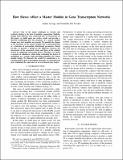How slaves affect a master module in gene transcription networks
Author(s)
Gyorgy, Andras; Del Vecchio, Domitilla
DownloadDel Vecchio_How slaves.pdf (400.8Kb)
OPEN_ACCESS_POLICY
Open Access Policy
Creative Commons Attribution-Noncommercial-Share Alike
Terms of use
Metadata
Show full item recordAbstract
One of the major challenges in systems and synthetic biology is the lack of modular composition. Modules change their behavior once connected, due to retroactivity. In this paper, we build upon our earlier results and provide a theorem establishing how the dynamics of a master module change once slave modules are present. We quantify the change in the dynamics of the master module due to interconnection as a function of measurable biochemical parameters. Based on this, we provide a bound on the difference between the trajectories of the connected system and those of the isolated system by employing contraction theory. Therefore, we obtain a measure of robustness, which helps evaluating the degree of modularity in a system, while providing guidelines for robust module design. We illustrate the results by considering a recurring motif in gene transcription networks: an autorepressed gene regulating the expression of several downstream targets.
Date issued
2013-12Department
Massachusetts Institute of Technology. Department of Electrical Engineering and Computer Science; Massachusetts Institute of Technology. Department of Mechanical EngineeringJournal
Proceedings of the 52nd IEEE Conference on Decision and Control
Publisher
Institute of Electrical and Electronics Engineers (IEEE)
Citation
Gyorgy, Andras, and Domitilla Del Vecchio. “How Slaves Affect a Master Module in Gene Transcription Networks.” 52nd IEEE Conference on Decision and Control (December 2013).
Version: Author's final manuscript
ISBN
978-1-4673-5717-3
978-1-4673-5714-2
978-1-4799-1381-7
ISSN
0743-1546